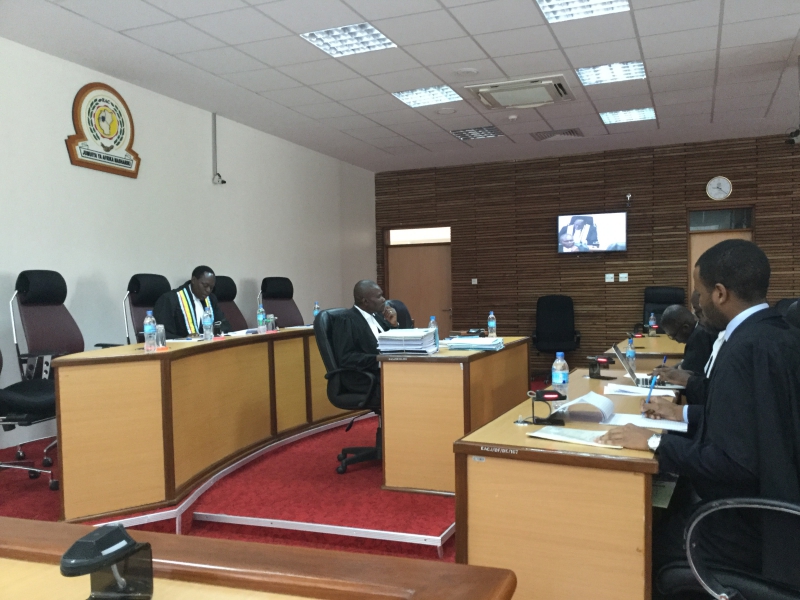
Court Dismisses Tanzania’s Objection Blocking Village Councils in Ngorongoro not to sue the Government over Land Eviction Dispute
East African Court of Justice Arusha, 26th January 2018:
The First Instance Division dismissed a preliminary objection raised by Attorney General of the United Republic of Tanzania challenging the Local Councils (LCs) of four (4) Village Councils in Ngorongoro Region in Arusha, blocking them to sue the Government over a land eviction dispute.
The Attorney General had argued that the Applicants (Village Councils) don’t have the requisite authority to institute the case at the East African Court of Justice against the Government. The Court in its ruling determined that the Village Councils have the Legal capacity to sue the government of Tanzania before this Court because it is a body corporate.
The Court in its ruling further said that Article 30(1) of the Treaty and Rule 17(3) & (5) of the Court gives locus stand before this court to a Village Council which is a body corporate in the terms of Article 26(2) of the Local Government of (District Authorities) Act, 1982.
The Court further ordered that the Application by the Ololosokwan Village Council and three (3) others, which was being challenged, be fixed for hearing. The Application is seeking Court to issue an interim order restraining and prohibiting the Government of Tanzania, from evicting the Applicants (Village Councils) from the disputed land and confiscating livestock grazing on the disputed land, until the main case filed before this Court is determined.
On 5th August, 2017, the Government of Tanzania through the Ngorongoro District Commissioner wrote a letter to the Applicants giving them five days to vacate land bordering the Serengeti National Park, and that the eviction, removal of livestock and the burning of bomas took place on land that legally belongs to the Applicants.
The Applicants argue that the Respondent’s foresaid impugned actions contravened and violated the Constitution of the United Republic of Tanzania, Village Land Act 1999 and Wildlife Conservation Act, 2009 as well as the Treaty for the Establishment of the EAC, Articles 6(d) and 7(1) of the Treaty.
The Applicants are Ololosokwani Village Council, Oloirien Village Council, Kirtalo Village Council and Arashi Village Council.
Present in Court were some members and heads of the Village Councils to receive the Ruling of the Court with their Advocate Mr. Donald Deya and Mr.
NOTES FOR EDITORS:
Article 30(1) of the Treaty provides that, “any person who is a resident in a Partner State may refer for determination by the Court, the legality of any Act, Regulation, Directive, Decision or action is unlawful or is an infringement of the provisions of this Treaty”
Article 26(2) of the Local Government of (District Authorities) Act, 1982 reads as follow; “Upon the issue of a certificate of incorporation in relation to a village council of the village in question shall, with effect from the date of that certificate, be a body corporate and shall. (…), (b) in its incorporate name, be capable of suing or being sued.
Rule 17(3) of the Court Rules, it states that “a corporate or company may either appear by its director, manager, or secretary, who is appointed by resolution under the seal of the corporation or the company, or may be represented by an advocate”
Rule 17 (5) of the Court provides that: The advocate for a party shall file with the Registrar a certificate that he or she is entitled to appear before a superior court of the Partner State”
-ENDS-
For more information, please contact:
Yufnalis Okubo
Registrar
East African Court of Justice
Arusha, Tanzania
Tel: +255 27 2162149
mail: Okubo [at] eachq.org
www.eacj.org
About the East African Court of Justice:
The East African Court of Justice (EACJ or ‘the Court’), is one of the organs of the East African Community established under Article 9 of the Treaty for the Establishment of the East African Community. Established in November 2001, the Court’s major responsibility is to ensure the adherence to law in the interpretation and application of and compliance with the EAC Treaty.
Arusha is the temporary seat of the Court until the Summit determines its permanent seat. The Court’s sub-registries are located in the respective National Courts in the Partner States.
Tags: EACJ
